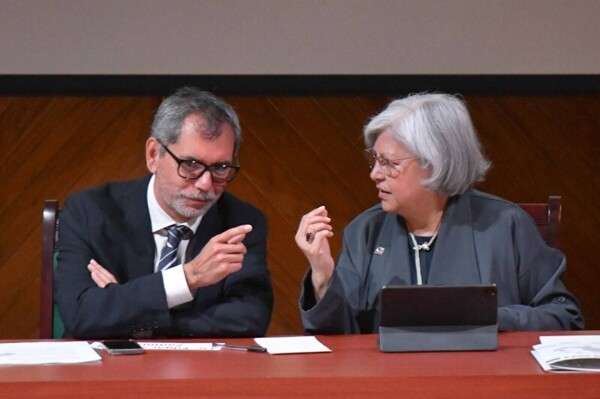
This Friday, Luz Elena González appeared before the Senate to explain and defend the key points of the energy policy in response to opposition criticism. The main issues revolved around the high debt of Pemex, the dependence on natural gas from the US, and the lack of private investment.
Some of the sharpest criticism came from the PRI, so the Secretary of Energy took the time to counter the energy reform of Enrique Peña Nieto, a project she held responsible for the current debt of the Mexican oil company, which amounts to around 100 billion dollars. She also questioned the destination of these resources.
González Escobar complained that of the oil tenders held, only 5% is currently being produced. "Where are the 200 billion dollars that were said to be coming to develop our industry?" she asked. As has been documented, there is particularly low participation in Pemex projects, as investors claim that all regulatory changes ultimately keep the oil company in its priority status.
The official dismissed the idea that the new model is less attractive for the private sector. "On the contrary, we are providing viability. With the new energy model, we are giving viability to both public and private investments because they need this long-term certainty framework," she said.
She defended the importance of giving priority to state-owned companies. "In one year, we have consolidated an energy model that returns strategic control of the sector to the state, strengthens sovereignty, and places energy at the service of the people," she said.
She assured that with the constitutional changes of this government, energy sovereignty was achieved, while they aim to reach the oil production target of 1.8 million barrels per day. She also stated that thanks to the new fiscal framework, Pemex's losses were reduced by almost 90% in September compared to the previous year, along with savings of almost 20 billion pesos, which are combined with other financial strategies.
The central role of Pemex complicates the mixed projects promoted by the government.
"The market recognizes that the path taken by Pemex is the path of sustainability and it is a very comprehensive path," she said.
She pointed out that, in parallel, the productive capacity of Pemex was dismantled, as well as the National Refining System and the petrochemical industry. In this sense, she noted that before 2018, Pemex had already become the most indebted oil company in the world, "but it was not to generate the country's productive capacity, and to this day we do not know for what purpose," she pointed out.
In the case of the electric company, she said that "CFE is the only company that can guarantee the reliability of the national electric system."
Regarding Pemex, she assured that they are recovering businesses that the Mexican state had lost with the energy reform.
She also reported that the Olmeca refinery in Dos Bocas is already refining 270,000 barrels, being the one that produces the most gasoline in the country.
"Throughout this year, this entire planning process has had very good results that have been materialized in long-term plans that synthesize that vision of the future and project us further," she said.
Another criticism that arose among the senators was about the low participation of the private sector. It should be noted that during her appearance, she did not mention the debt to suppliers, which doubled during the previous six-year term.
Pemex suppliers accuse that the cost overrun of Dos Bocas explains the increase in debt.
She also accused the previous government of having "lost all reliability in the electricity sector, because private generation cannot drive long-term development because private goods conflict with public goods. Instead, she defended that the energy policy she leads has achieved a new order in the sector."














